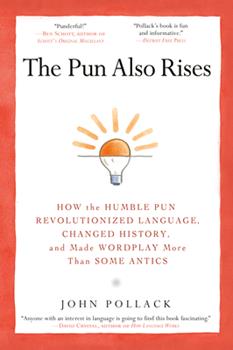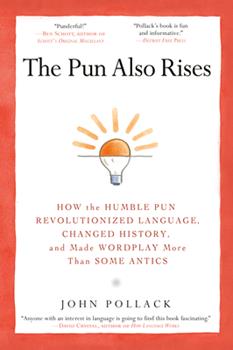Puns have been around for centuries and still endure today. Why does the humble pun have such longevity? Because we all like playing with language. Quite a lot of ordinary people love puns. They are interlinked with a very human desire: they let us show off, verbally.
Puns are a feature of human interaction with language—we have a long tradition of (word) play. says Professor John Hajek, Professor of Italian Studies and linguist in the University of Melbourne’s School of Languages and Linguistics.
We have been hearing, singing, uttering puns most of our lives, beginning with nursery rhymes, school yard chants and riddles. They have been a common creative force in language and literary play over the ages.
Although puns seem to be particularly characteristic of languages like English, they are in all languages to a degree. English is sort of a mutt of language, which led to a lot of overlapping sounds and a lot bigger vocabulary with which to play. English is also full of homonyms (words that sound the same but are completely unrelated). And that always makes for great punning.
The word pun has no direct equivalence in languages like Italian or French. English grammar is less complex than other languages, which according to Professor Hajek means “you don’t have to worry so much about the endings of words.”
Definition:
pun1 | pən | noun — a joke exploiting the different possible meanings of a word or the fact that there are words which sound alike but have different meanings: the pigs were a squeal (if you’ll forgive the pun).
The technical name for PUN is paronomasia (in Greek, “equal word”), which sounds more like a brain disorder than anything else. “A pun . . . has been defined as a play upun words and a bad pun as two-thirds of a pun”— (Richard Lederer)
Puns are divisive in comedy, because they are a form of wordplay that makes a joke by exploiting the different possible meanings of a word. They contain words that have both a literal and figurative meaning, which is largely the trick of combining two or more ideas within a single word or expression. They challenge us to apply the greatest possible pressure per square syllable of language. Punning surprises us by flouting the law of nature, which pretends that two things cannot occupy the same space at the same time. Punning is an exercise of the mind in being concise. (Ricard Leherer)
A pun gives new meaning to something familiar. There’s a sense of shared cleverness and intelligence when you get the joke. Puns are sometimes cringe inducing — but often they hit the funny bone at just the right place.
“In puns—where words have multiple, ambiguous meanings—the sentence context primes us to interpret a word in a specific way, an operation that occurs in the left hemisphere. Humor emerges when the right hemisphere subsequently clues us in to the word’s other, unanticipated meaning, triggering what Buchanan calls a “surprise reinterpretation.” (Roni Jacobson article.
The inherent fluidity of language is the pun-trepreneur’s delight and provides a person with the ability to parse language, to understand the nuances and complexities of words.
Puns can be a sign of high intellect. yes, even the dumbest of puns can be a sign of intelligence, (that’s amazing!) because puns generally require more processing effort than messages where simple forms of rhetoric are used.
“The brain goes through some incredible gymnastics to capture the meaning of puns,” Pollack tells Weekend Edition Sunday‘s Liane Hanson. “And if you think about it, it’s incredibly complex. Especially when two words can sound exactly alike. The power of a pun comes from two things,” he says. “One is its ambiguity, and second is: that it enables you to pack more meaning, or more layers of meaning, into fewer words. And so if you’re trying to convey complex ideas, puns can be really powerful tools to do that.”
Puns help people communicate more economically and effectively, so telling a pun is a demonstration of skill. It is a virtuoso talent of a dramatist or poet who has a vested interest in showing how clever they can be in telling a good pun. Puns are only successful if you “assume that people will work it out
You might not have noticed how completely puns have infiltrated our lives. They’re everywhere.
Language games involving puns have been used as an aid to improve linguistic memory and expand second language vocabulary. By turning language completely on its head, puns actually fast-track the learner into absorbing a second culture.
Puns supply groan-worthy headlines in journalism that would probably be much less eye-catching, memorable, and pithy. It’s been said that “a frisky trick of journalism is the headline that shakes a cliché to rattle a metaphor to ring a pun,” to catch a reader’s attention. Somehow, it works, no matter what the critics say about the quality or tastefulness of puns.
Puns have had a major influence in areas you wouldn’t, even at first, consider. For one thing, marketing and advertising. An astonishing number of ads use puns to make a point—and a buck.
- “This is the way the English keep their gin up” (an ad for Gordon Gin)
- Cricket Lighter promises “thousands of sure fire lights.”
- STP is “the Racer’s Edge.”
- Pepsi has “the taste that stops the others cold,”
- 7-Up claims to be the “cure for the common cola.”
- Bell Telephone urges us to purchase an extension phone, “Don’t run for the ring: reach for it,” for a Touch-Tone phone,
- “Punch a friend.” And speaking of punches, there’s the eternal dupe who always says yes.
Public service messages use the same language strategies:
- “Be wreckless, not reckless”;
- “Children should be seen and not hurt”;
- “Every litter bit hurts”;
- “Smoking: it’s a matter of life and breath”;
- “Don’t be fuelish.” (From Richard Leherer)
- “Cigarette? No thanks. I can live without it” from the American Cancer Society?
Would these ads be more effective or memorable without the pun?
What is it exactly that makes a pun funny (at least to those of us who humbly accept the power of the pun)?
Example: Why were the teacher’s eyes crossed? Because she couldn’t control her pupils.
This pun has “semantic ambiguity. Part of the fun in a funny pun is thinking through the two meanings of the word in question. Researchers note that both meanings of the ambiguous word (pupil) are true at the same time. A pun still must make some kind of acceptable sense to the reader or listener.
You hear a really bad joke, everyone collectively groans … it’s a bonding exercise.”
“So in the right hands, it seems, puns can be versatile, eye-catching expressions that make us think, adding poetic color to otherwise dull, straight-laced sayings.” (Chi Luu)
When it comes to puns, it often seems like people are either lovers or haters. Edgar Allan Poe once said, “Of puns it has been said that those most dislike who are least able to utter them.”
“Punners gonna pun and pun-shunners gonna shun.” (Julie Beck Article)
Depending on your sense of humor, puns are either the height of witty wordplay or cringe-worthy ‘Dad jokes’.
Pollack points out that trends in humor come and go, and puns aren’t necessarily in vogue right now. (Julie Beck article)
“I think another question to ask that’s just as relevant is why is sarcasm considered cool by the same people who often decry puns as uncool?” Pollack asks. “Both are a way of saying one thing and meaning another. In an age of cynicism it’s safer, socially, to tear something down through sarcasm or irony than it is to build something up through punning.”(Julie Beck article)
Peter McGraw, the director of the Humor Research Lab at the University of Colorado, Boulder, has a theory about what makes things funny. He calls it a benign violation—something that subverts or threatens a norm, but not in a way that feels harmful. Puns would fall under the pun-brella of communication violations, though both Pollack and McGraw point out that they’re often more about getting an “Aha!” than a “Haha!” (Julie Beck’s article)
Puns are a totally frivolous unnecessary thing to say most of the time. Some may say they are a waste of time. There’s a conversation going on and the punster keeps interrupting the flow of discussion with groan-worthy one-liners. A pun side-tracks you. It usually is just to derail the conversation or to add wordplay when wordplay doesn’t belong there, it’s kind of like the annoying younger brother or sister of the comedy world.”
“Puns play with meaning—they give the wrong names to the wrong things—and they disturb the proper flow of communication.” (Chi Luu )
But if puns are the annoying little siblings of comedy, then like a baby brother who won’t stop asking “Why?” after everything you say, a punster is probably often just looking for a reaction, be it “Aha!,” “Haha!” or “No.” The reactions are the pun-der that comes after the lightning of the joke. They’re part of the whole pun experience.
Unlike a lot of other kinds of jokes, the groans and the outrage—mock or not—are part and parcel of pun performance. The reactions are the pun-der (help) that comes after the lightning of the joke itself. They’re part of the whole pun experience.
“Puns are threatening because puns reveal the arbitrariness of meaning, and the layers of nuance that can be packed onto a single word,” says John Pollack, a communications consultant and author of The Pun Also Rises.
“Bottom line: puns get on everyone’s nerves.” (Roni Jacobson article) Yet, it seems likely that we’ll be stuck with puns for a while longer.
Resources:
Your Pun-Divided Attention: How the Brain Processes Wordplay By Roni Jacobson on December 1, 2016. Taken from: https://www.scientificamerican.com/article/your-pun-divided-attention-how-the-brain-processes-wordplay/
Why Do Puns Make People Groan? By Julie Beck, JULY 10, 2015. Found at: https://www.theatlantic.com/technology/archive/2015/07/why-do-puns-make-people-groan/398252/
What Makes a Pun Funny? by Virginia Hughes. Published October 19, 2011. From https://www.nationalgeographic.com/science/article/what-makes-a-pun-funny
The Science Behind What Makes Puns So Irresistible By Lauren Vinopal, Updated Oct 26 2021, 11:02 AM. Taken from: https://www.fatherly.com/health-science/the-science-behind-the-puns/
THE POWER OF THE PUN By Anders Furze, University of Melbourne from: https://pursuit.unimelb.edu.au/articles/the-power-of-the-pun
A Primer of Puns, by Richard Ledereer, The English Journal, Oct., 1981, Vol. 70, No. 6 (Oct., 1981), pp. 32-36 Published by: National Council of Teachers of English Stable URL: https://www.jstor.org/stable/817149
Linguistic Anarchy! It’s all Pun and Games Until Somebody Loses a Sig By Chi Luu October 27, 2015, LINGUA OBSCURA From: https://daily.jstor.org/linguistic-anarchy-pun-games-somebody-loses-sign/
Not Jest For Pun: A Surprising History Of Wordplay Heard on Weekend Edition Sunday
May 14, 20117:48 PM ET. from: https://www.npr.org/2011/05/15/136253845/not-jest-for-pun-a-surprising-history-of-wordplay

BY JOHN POLLACK
HARDCOVER, 240 PAGES
GOTHAM
LIST PRICE: $22.50
Some fun puns:
Photons have mass? I didn’t even know they were Catholic! (Virginia Hughes)
Do you know what really bugs me? Insect puns. (Anders Furze)
A Freudian slip is when you say one thing and mean your mother. (Anders Furze)
It was an emotional wedding, even the cake was in tiers. (Anders Furze)
What kind of shoes are made out of banana skin? (Slippers.) (Richard Leherer)
What makes the tower of Pisa lean? It never eats. (Richard Leherer)
Who was the most popular actor in the Bible? Samson. He brought down the house.
What did Samson die of? Fallen arches.
Every litter but hurts. (anti-pollution ad)
Tanfastic (a suntan lotion).
Vidiot: Someone who watches too much television. (daffinition)
It’s time to go to the dentist at tooth-hurty.
The past, the present, and the future walk into a bar. It was tense. (Chi Luu )

Interesting puns.
I really thought folks would add a few of their own.
😀